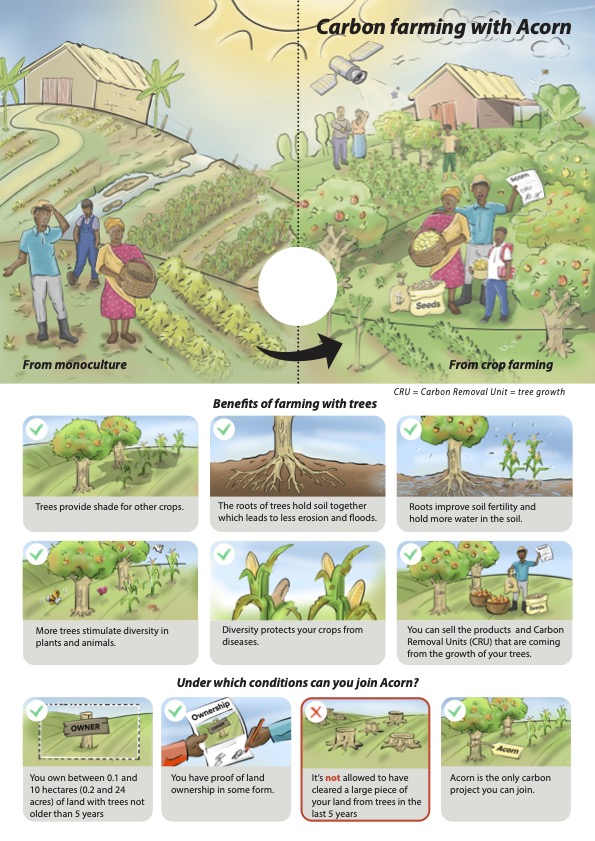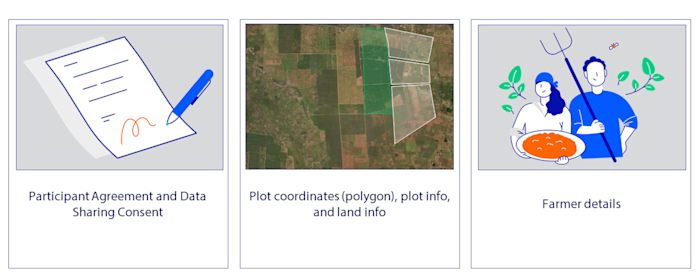
The data collector role
Content
This article will discuss the following topics:
What do you do as a data collector?
Farmer engagement and required skills
What data will you collect?
Using the DCT App
Ensuring data quality
What do you do as a data collector?
As data collector, you work together with your local partner to onboard farmers. You make all necessary preparations for collection, know how to engage with farmers, and are capable of using the DCT app to collect high-quality data.
As a data collector, you are the backbone of collection and the largest influencer of data quality.

Farmer engagement and required skills
As a data collector, you will most likely be the first point of contact for the farmer. You must be able to explain all concepts surrounding Acorn as well as the requirements and commitments of the program. So you must know how to approach a farmer and keep their attention, as well as the following:
You must know how to explain the Acorn program
These questions clarify what you should understand and be able to explain to farmers regarding the Acorn program.
What is the Acorn program?
What is climate change, and how does if effect farmers?
What is carbon, and how does it relate to climate change?
What is agroforestry?
How can Acorn help facilitate agroforestry?
You must know how to explain all requirements, expectations and rights of the farmer
These questions clarify what you should understand and be able to explain to farmers regarding their requirements, expectations, and rights.
Which farmers are eligible for Acorn?
What obligations must you abide to follow the Acorn program?
What can the farmer expect from Acorn?
What can the farmer expect from the Local Partner?
What is the participant agreement?
What is data-sharing consent? Or: what data does Acorn use and how?
What data will you collect?
The DCT App is fully integrated in the Acorn program. This means that all data you collect is necessary for participation in the program. This ranges from legal contracts to plot information.
Data you will collect:
Participation criteria
Farmer information (e.g. name and village)
Contact information (e.g. address and phone number)
Contracts (the Participant Agreement and Data-Sharing Consent)
Land information (e.g. land use, crops)
Polygons and plot information

Using the DCT App
The app is meant to guide you through the data collection process and to get the correct data the first time around.
With the DCT App, it's possible to collect data offline, collect polygons, and to see overlapping plots and edit them if necessary.
Once you've got an internet connection again, you can submit the data to your local partner.

Ensuring data quality
As mentioned before, as data collector you ensure data quality. What makes for good data differs per project.
Data quality: polygons
Polygons are the shape of the tracked plot. The quality of polygon data varies greatly. This can be due to multiple factors, like GPS inaccuracy or incorrect app usage.
So what is a good-quality polygon? A good-quality polygon is a shape that accurately represents a farm.
Remember, only the area of the polygon will be used for biomass measurements. If the polygon is smaller than the actual farm, farmers run the risk of having inaccurate measurements. If the polygon is larger than the farm, this will have consequences as well. For more information, please refer to the article on polygon quality.
Data quality: Acorn contracts
Within the Acorn project, you will need to collect legal documents: the Participant Agreement and Data-Sharing Consent. These can both be collected digitally or on paper. Having the correct document properly imported and organized is an important part of collection. For more information, please refer to the article on Acorn contracts.
Data quality: farmer details
Address: Many fields in the DCT app regarding a farmer's address are optional. This is due to the fact that many countries use different address systems. It is still very important to gather any information that is available to you. Please refer to your local partner to discuss what high-quality address data looks like for your project.
Contact details: Be it for farmer pay-outs or planning a seedling drop, it is important to be able to reach your farmers. When collecting farmer's profiles, make sure you enter the correct phone number and/or email address.